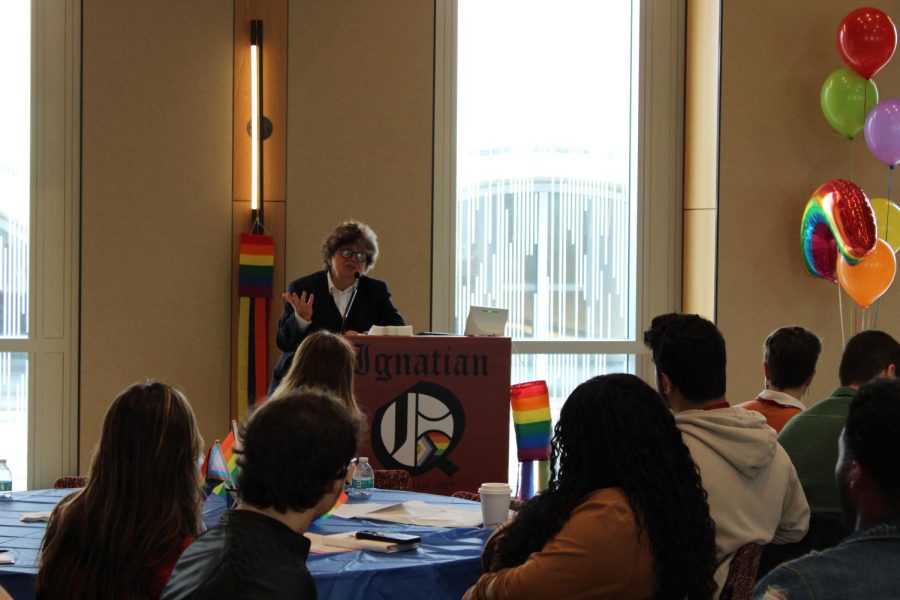Fordham Hosts Ignatian Q Conference for the First Time Since 2014
In 2014, the first Ignatian Q conference was held here at Fordham, and on Friday April 21, it returned. Ignatian Q is a conference that develops spirituality and affirms humanity for LGBTQ+ students at Jesuit schools. A different Jesuit school hosted Ignatian Q each year until 2020, and every conference has a different theme. This year’s theme was “Homines Pro Aliis: Queer Activism Rooted in Justice and Love.”
The conference began on Friday at the Lincoln Center campus. At the welcome ceremony, Fr. Bryan Massingale, S.T.D., a priest of the Archdiocese of Milwaukee, a professor at Fordham and an advocate for queer inclusion in Catholic spaces, spoke about the power of dreaming. Massingale quoted the historian Robin Kelley, who believed that dreaming is vital because it allows us to imagine alternatives and “bring them to fruition.” The night concluded with a scavenger hunt in Greenwich Village, the historically gay neighborhood in lower Manhattan.
The keynote speaker for the second day of the conference was Joan Garry, a Fordham alumna and a nationally recognized LGBTQ+ activist. Garry spent ten years at the helm of the Gay & Lesbian Alliance Against Defamation (GLAAD) and throughout her career has advocated for more accurate representation of queer people in the media and news. She credited the Jesuit education she received at Fordham for teaching her how to use her education for leadership and activism.
Garry’s speech focused on the obstacles that LGBTQ+ students face both as they decide where to attend college and as they attend college. Garry called on colleges and universities to create a more welcoming environment for queer students, but also granted that institutions were unlikely to change unless pushed to do so by their students. Declaring that “visibility drives understanding and understanding drives acceptance,” Garry called on queer students and their allies to “model activism for those who are struggling.”
Sunday’s speaker was Fr. James Martin, S.J. Martin has advocated for queer inclusion for much of his career, and has met with Pope Francis to discuss the Church’s treatment of LGBTQ+ Catholics. He argued that, not only does Catholic and Jesuit social teaching focus on helping the marginalized, the Bible also encourages it. Martin’s speech focused on Jesus’s work with people on the margins of society, and provided theological justification for queer ministry and acceptance.
After Martin’s speech, conference attendees asked him questions concerning Catholicism and queerness. The questions mostly focused on the progress the Church has made and the work that is left to be done regarding queer Catholics.
While Martin said that progress is not linear, he declared that the “trend of bishops, priests and laypeople coming out is not going to end,” and that acceptance of LGBTQ+ Catholics will increase as members of the Church get to know queer people and come to understand that they come from all walks of life.
Ben Reilly, FCRH ’23, chair of the Ignatian Q conference, said that “the most rewarding part of organizing Ignatian Q has been the opportunity to foster a sense of welcome for LGBTQ+ students.” While Reilly said the process of putting on Ignatian Q has been time consuming, he wants the conference to make a lasting difference at Fordham.
He said he hopes that by discussing the intersections of queerness and spirituality with students and speakers from across the country, “we can more clearly see the reality of the queer experience, discern proper actions for queer inclusion, and move forward together.”
Details of the conference can be found on Fordham News.










































































































































































































